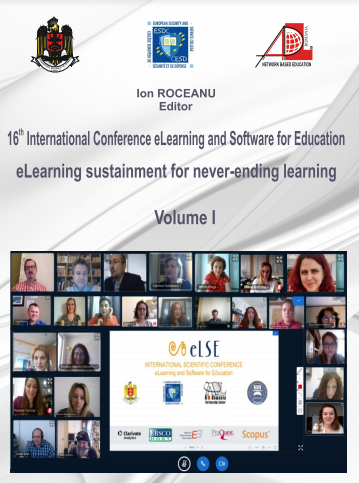MULTIMEDIA AND DIGITAL TOOLS. BASICS OF CIVIC AND ETHICAL EDUCATION IN PRE-PRIMARY AND PRIMARY SCHOOL
MULTIMEDIA AND DIGITAL TOOLS. BASICS OF CIVIC AND ETHICAL EDUCATION IN PRE-PRIMARY AND PRIMARY SCHOOL
Author(s): Mihaela Gabriela Neacșu, Florentina BucuroiuSubject(s): Ethics / Practical Philosophy, Preschool education, School education, ICT Information and Communications Technologies, Distance learning / e-learning, Pedagogy
Published by: Carol I National Defence University Publishing House
Keywords: multimedia tools; digital tools; educational software; interactive learning; civic and ethical education;
Summary/Abstract: This paper presents the findings of a psycho-pedagogical study on the effectiveness of certain multimedia apps and of a software program for civic and ethical education in pre-primary and primary school. The purpose of this study is both the analysis of the capitalization of various forms of multimedia, audio, image, animation, video content, interactive content forms and of the new educational software for shaping the social-civic skills of young pupils. The methodology employed is qualitative. The specific objectives of this study are: - An analysis of the pedagogical ways of integration of the multimedia and digital tools in the didactic process of civic and ethical education for young pupils; - An analysis of the complementarity of education forms and capitalisation of the multimedia and digital tools for shaping the social-civic skills of young pupils; - Best practice reflections on integrating multimedia education means in Romanian pre-university education. The conclusions of this study highlight the importance of integrating multimedia means in the civic and ethical education of young pupils so as to enable greater engagement of students in their own civic shaping, capitalisation of the differentiated and personalized content of civic education, a flexible structuring of the learning times, understanding civic reality based on case studies reflecting reality, the formation of pro-social attitudes and behaviours based on concrete examples. The advantages and limitations of using these formative tools and means are highlighted: multisensory stimulation in presenting the information, stimulation of critical thinking, purpose-oriented learning, individual exploration/search of information and operating on it, contributions to the knowledge of the immediate civic reality etc.
Journal: Conference proceedings of »eLearning and Software for Education« (eLSE)
- Issue Year: 16/2020
- Issue No: 01
- Page Range: 362-368
- Page Count: 7
- Language: English

